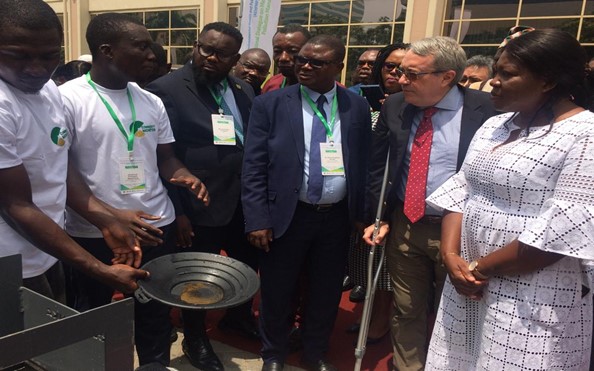…with nationwide construction of collection and dismantling centres
By Deborah Asantewaah SARFO
The Executive Director of the Environmental Protection Agency (EPA), Dr. John Kingsley Krugu has announced the Agency’s initiative in constructing a nationwide collection and dismantling centres to address the growing concern of electronic waste (e-waste) pollution in the country.
According to him, the EPA through a collaborative effort with the private sector partners have identified specific sites for the construction works of these centres adding that the initiative would be a “significant milestone towards the sound management of e-waste in the country and ensure the circularity of e-waste materials”.
He pointed out that the actions carried out by the Agency are a component of the progress the country has made with funding from the Global Environmental Facility (GEF) under the Africa Environmental Health and Pollution Management Programme (AEHPMP).
Dr. Krugu, disclosed this during a ‘Regional Dialogue of the AEHPMP on mercury and e-waste pollution management,’ in Accra. The event was organised as part of a knowledge and information sharing initiative among five selected African countries – Kenya, Senegal, Tanzania, Zambia, and Ghana.
“The agency has also identified sites in collaboration with private sector partners for the commencement of construction, waste for collection and dismantling centres across the country,” he indicated.
The AEHPMP is a comprehensive programme aimed at developing an integrated e-waste management system to prevent the release of pollutants into the environment and also reduce exposure to mercury and regulate mercury use in Artisanal Small-Scale Gold Mining (ASGM).
The Minister for Environment, Science, Technology and Innovation (MESTI), Ophelia Mensah Hayford, in her keynote address, said “Global E-Waste Monitor reported a record 62 million tonnes of e-waste produced in 2022 and less than a quarter 22.3 percent was collected and recycled in an environmentally sound manner.”
Turning her attention to the immense contribution of the ASGM sector to the country’s economy she said it contributes about a third of the country’s total gold production.
However, she said the improper handling, storage, use and disposal of mercury has resulted in some documented cases of mercury intoxication and poisoning among miners and non-miners in ASGM communities.
“It is not surprising that Gold is Ghana’s foremost mineral and accounts for 90 percent of Ghana’s total mineral exports. ASGM contributes approximately a third to this total gold production.
“The ASGM sub-sector is therefore very critical to our nation’s economy and its relevance stems from its contribution to employment (especially women and youth) and direct foreign exchange from gold exports,” she explained.
Highlighting some positive results in the ASGM sector, Dr. Krugu stated that through the AEHPMP, a communication strategy has been developed to direct and mould their interactions with stakeholders. The stakeholders include miners, mining community, local government, traditional authorities, media, policy makers and others.
The efforts is to in raise awareness on the dangers of mercury to human health and the environement, he added.
He noted that as part of the programme, they are also highlighting some mercury-free technologies developed by the University of Mines and Technology (UMAT), Minerals Commission and other private companies to expose miners to the other alternatives available for gold extraction other than using mercury.
The Lead Environmental Specialist at the World Bank, Aziz Lagnaoui, indicated that “a serious knowledge gap” on the impacts of mercury exists in most countries hence the essence of the regional dialogue.
He said until the education on the negative impacts of mercury and other chemicals are communicated to citizens, there would be no results.
He, therefore, urged participants at dialogue to consider the local resources available in their respective countries as well as its suitability to when implementing a technology innovation, they have been exposed to.
Also, the Country Director of Ghana at the World Bank, Robert Taliercio, emphasised on collaboration between regions in addressing the environmental and public health threats from mercury exposure and other pollutants as it affects everyone and everything – air, water and cosmetics.









